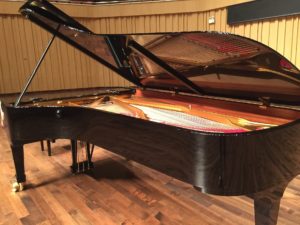Editor’s Note: Our resident blogger, Christopher Richardson, recently placed first in the Young Artist category at the California Music Teachers National Association (MTNA) competition. We conducted this interview with Christopher to find out more about his latest accomplishment and how he prepared for the event.

Q: Christopher, congratulations on your recent victory in the Young Artist category at the CA MTNA competition! Can you tell us a little bit about the competition? How many participants? Where were they from? What ages?
Christopher: The competition is divided into three parts. The first part is the state competition, which is the one I won. The second part is the division competition, in my case the Southwest division, in which I will compete with the winners from the other five states in my division (Hawaii, Nevada, Utah, New Mexico, and Arizona). The winner competes in the national competition during the National MTNA Conference, which takes place in Florida this time. There were eleven participants in my category, which comprised of California pianists of ages 19-26. We were identified by a given ID number for the competition, so I do not know who they were or their origins.
Q: What piece did you play? Why did you choose that selection? What were the requirements for your selection?
Christopher: Everyone was required to play repertoire from at least two contrasting periods (such as Baroque or Classical) with a time limit of forty minutes. I played Chopin’s Third Piano Sonata Op. 58 and Beethoven’s Piano Sonata Op. 81a “Les Adieux.”
Q: With your busy schedule as a pre-med student at Berkeley, how and when do you find time to practice?
Christopher: It definitely can be a struggle, especially when midterms and finals start. I try my best to be as efficient with my time as possible, even using the few minutes before lectures start and the time between classes to get some homework done so I can spend the evening practicing.
Q: Where do you practice? What kind of piano is it?
For the most part, I practice at home (I commute to school) on a Steinway and Sons Model A piano.
Q: Speaking of pianos, what was the piano like at the competition? Did you get to test out the piano before you played it?
Christopher: The piano at the competition was pretty solid, though the lower register was a little heavy and resisted lighter touches. I did not get to try out the piano prior to performing.
Q: What was the audience like at the competition? How many judges? Were friends and family there too? (Why wasn’t I invited? 😉 )
Christopher: Although this part of the competition was open to the public, few people actually attend. The atmosphere was more similar to an audition than anything else. The real audience comes at the MTNA Conference, where the finals take place. There were three judges.
Q: What goes through your mind when you’re playing a piece in a competition?
Christopher: When I perform, I see it as putting my heart out to the audience. I find I can most easily immerse myself in what I’m doing in public performances. I practiced a lot before going on stage, I have my interpretation and the structure down. Thus, rather than coherent thoughts, I follow my instincts and my sounds, trying to squeeze every last drop of musicality I can. I don’t have the time during a performance to let my mind go anywhere other than what is happening at the moment in the piece I am playing.
Q: How do they announce the winners? Were you surprised?
Christopher: The winners were announced via email the night of the competition. I was more excited than surprised with the results.
Congratulations again, Christopher! Have a great holiday and enjoy your rest! Best of luck in the next stage of the competition, to be held in early January at the School of Music, University of Nevada, in Las Vegas, Nevada.